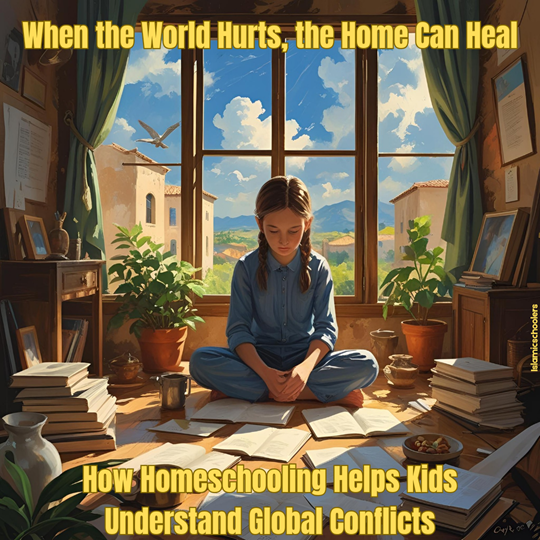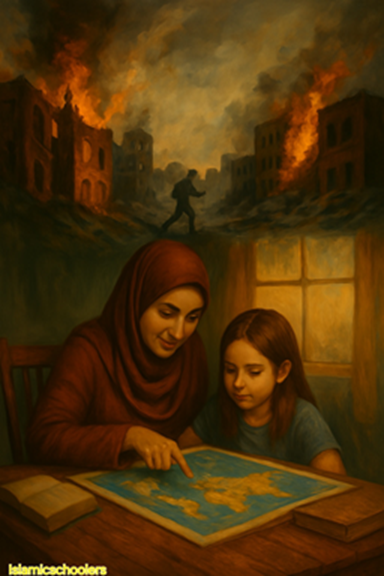
A mother reads headlines that speak of war, loss, and displacement. A father watches videos of families fleeing their homes, holding their children close. Though their own homes are peaceful, the weight of the world settles heavily in their hearts. In such moments, many parents are asking a simple question: “How can I raise my children to be strong, kind, and aware in such a broken world?”
For families choosing to homeschool, this question leads to a powerful opportunity. Homeschooling benefits extend beyond academics, allowing parents to shape learning that not only informs but also inspires. When done with care and intention, homeschooling in a time of global conflict can help children develop empathy, emotional strength, and a better understanding of the world they live in.
Helping Children Understand Without Fear
Children today are more exposed than ever. Whether it’s through social media, overheard conversations, or television, they quickly sense when something is wrong. Rather than avoiding tough subjects, homeschooling allows parents to guide kids through sensitive topics gently and honestly.
A simple question like “Why are those children crying?” can lead to meaningful discussions on compassion, courage, and humanity. Teaching global awareness at home gives children the tools to understand what’s happening, not with fear, but with thoughtful curiosity and care.
Through carefully chosen books, videos, and family discussions, parents can introduce topics like war, peace, justice, and kindness in ways that match their child’s age and emotional level.
Turning World Events into Meaningful Learning
Instead of shielding children from everything negative, homeschooling allows parents to use world events as real-life learning opportunities. Whether it’s learning about the culture of Ukraine, exploring the history of Palestine, or understanding what refugees go through, children can gain real-world knowledge that is often missing in traditional schools.
Here’s how global conflicts can become meaningful lessons through educational activities at home:
• Geography: Locate affected countries on a globe or map.
• History: Understand the roots of conflict and what past generations have learned.
• Writing: Write letters of peace, thank-you notes to relief workers, or personal reflections.
• Art: Draw messages of hope, create storybooks about peace, or paint flags of different nations.
• Reading: Choose diverse books that highlight voices from war-touched regions.
• Civics: Learn about international organizations like the UN, Red Cross, and humanitarian aid groups.
These activities don’t just teach facts, they develop empathy, critical thinking, and a global mindset.
Creating a Positive Learning Environment at Home
When parents wonder how to homeschool kids during stressful times, the answer lies in simplicity and purpose. You don’t need expensive resources or fancy classrooms. What matters most is a calm space, a caring adult, and the intention to make learning feel safe and meaningful.
Here are some homeschooling tips for parents who want to turn world awareness into strength:
• Stick to gentle routines that offer structure without pressure.
• Include emotional check-ins: Ask your child how they feel about what they’re learning.
• Celebrate small victories: Whether it’s reading a new book or finishing a drawing, praise their efforts.
• Keep learning hands-on: Use play, art, and storytelling to make learning enjoyable and memorable.
• Stay hopeful: End each lesson with something positive, stories of helpers, acts of bravery, or steps toward peace.
Raising Kind, Informed, and Resilient Kids
Many parents choose homeschooling because they want their children to learn more than just math and reading. They want to raise thoughtful human beings, those who not only succeed in life but make life better for others.
By using the ongoing global crises as quiet lessons, parents can teach their children how to:
• Stand up for what is right.
• Show compassion to those in need.
• Understand cultures different from their own.
• Think critically, not just repeat what they hear.
• Be thankful for safety, freedom, and opportunity.
These are the life lessons that build character. They are not found in every textbook, but they are planted every day in homes where positive parenting during difficult times becomes a quiet revolution.
Why Homeschooling Matters Now More Than Ever
You don’t have to be in a war zone to feel the weight of the world. But you can respond to it by raising children who are not afraid to face it. Homeschooling in a time of global uncertainty is not just about keeping kids busy, it’s about shaping a generation that understands both the pain and the power of the world around them.
As a parent, your efforts may seem small, a story here, a drawing there, a question answered gently. But these moments matter. They build strength. They plant seeds of kindness. They create homes where learning becomes a light in the darkness.
So as the world continues to struggle, remember this: your home can still be a place of peace, purpose, and powerful education.


